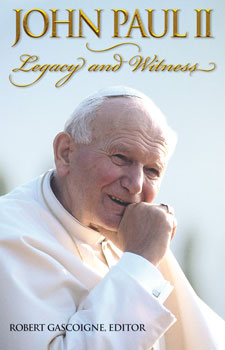Robert Gascoigne has collated a series of essays written by Australian Roman Catholic theologians and academics which introduce, and comment on, the highlights of the ministry of Pope John Paul the second.
The essays begin with a description of his early life in a war torn and savaged Poland, crushed and divided between Russia and Germany, where, it is suggested, the only identity of the Polish people was that which was found in Roman Catholic Church.
 It is in this environment that John Paul developed his unique and embracing faith. His desire that "The Church wishes to serve this single end: that each person may be able to find Christ, in order that Christ may walk with each person" is the underlying theme of many of the essays.
It is in this environment that John Paul developed his unique and embracing faith. His desire that "The Church wishes to serve this single end: that each person may be able to find Christ, in order that Christ may walk with each person" is the underlying theme of many of the essays.
After establishing the background environment the essays touch on poetry, philosophy, social conscience, sacrament, suffering and gospel. All are written from a Roman Catholic perspective, and with an integrity which offers particular gems that the non Roman Catholic may not have realised.
For example, John Paul insisted that there be dialogue with other world religions and Christian denominations, not to claim that all were equal, but to recognise the mutual responsibility for peace and the freedom of God's people; to identify differences and then to discuss them rather than condemn. He was adamant that the Church has a social responsibility for the disadvantaged, and was frustrated that the richer countries were not acting quickly enough to bring relief to debt in developing countries.
Not all was plain sailing for John Paul. He was criticised for his devotion to Mary which he defended on the basis of her obedience and humility which brought her to participate in a balanced, Trinitarian and Christological expression of faith. He was opposed by some leading theologians when he spoke against the so called "just war" in Iraq. His sensitivity to creation was unwelcome in developed countries. He suggested that the current ecological crisis is a moral and spiritual problem arising from a greed for, and the plundering of, natural resources. As a member of Solidarity he supported the workers rights to combine their strength in order to work for the common good, even to the point of strike action.
The spirituality of John Paul was formed on the basis of his reading of such authors as John of the Cross. It is in these writings that he found a proper balance between religion and society. He believed that humanity is given dignity by Christ, and so he did not make a distinction between a "good Church" and an "evil world". Rather, he understood that all people are reliant on Christ.
John Paul argued that the Church is fed on the Eucharist. It is in the Eucharist that the person communicates most closely with God. It is in the Eucharist that the Christian will be strengthened in order to live the Christian life. Eucharist is not a private action but an empowering and communal one. To know Christ is to live the mission to which we are called. Or in his words: "we come to faith, learn and grow in it by participating in and living the practices of the Christian Community. We need to overcome the bias that equates knowing with information."
I enjoyed reading these essays for they gave me an insight into the life and work of a person of whom I knew very little, and had never identified with. Some of the subjects covered in the essays I found encouraging and others challenged me to think more clearly and with more charity. For the person who would like a quick insight into the life and work of Pope John Paul the second this is a suitable resource. For those who have a stored up intolerance of the Roman Catholic Church and the Pope there is probably another book on the shelf that you would find to be more to your liking.




















